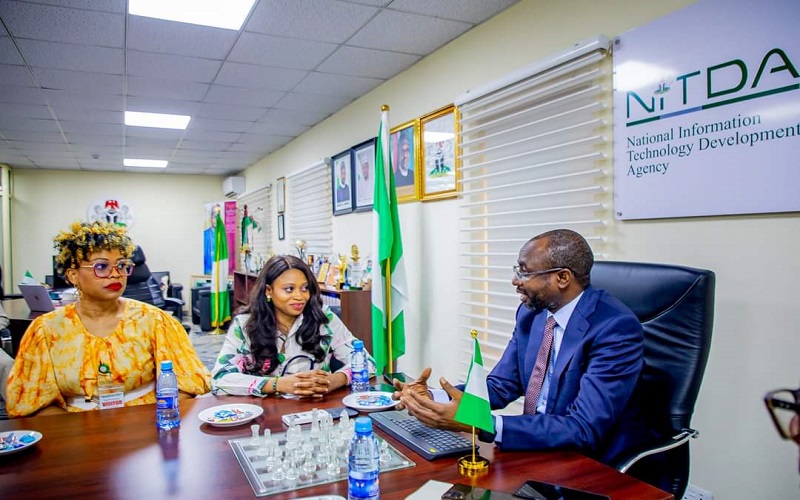The National Information Technology Development Agency (NITDA) has agreed to partner with LEAP Africa, a non-profit organisation that focuses on leadership development, to harness the potential of young Nigerians in the field of technology and entrepreneurship.
The partnership is also intended to equip young Nigerians with the necessary skills to take advantage of emerging opportunities in the tech industry.
The Director General of National Information Technology Development Agency (NITDA), Kashifu Inuwa made this disclosure during a visit by a team from LEAP Africa led by its Executive Director, Kehinde Ayeni to the Corporate Headquarters of the Agency.
Inuwa lamented that the surge of migration of Nigerian youths to other countries which is largely attributed to the quest for a better life is gradually depleting the nation’s talent resources and consequently made it imperative for the Federal Government of Nigeria to create enabling opportunities through the implementation of developmental guidelines, mentorship programmes, establishment of social infrastructures and funding that will enable innovation and entrepreneurship thrive in the country.
He stated that it is necessary to harness the talents of Nigerian youth and exploit the potential for their individual benefits and that of the country, adding that the country has a global competitive advantage due to its large population of young people.
While stating that technology is the major driver of the economy globally with people as its critical component, he opined that enormous attention should be given to the needs of innovators in order to create a flourishing and innovative ecosystem in the country.
Speaking on possible areas of collaboration with LEAP Africa, the NITDA boss said that the newly enacted Nigeria Startup Act is an instrument both organisations can leverage to unlock and ignite activities in the innovative and entrepreneurship ecosystem.
According to him, “The Act has been signed into law, the Council has been inaugurated, we have developed the implementation framework and we need partners to work together to implement it. We believe in collaboration because we cannot succeed in isolation. So, we need to work together as an ecosystem to achieve that.”
Giving further insight into the ingenuity and prospects of the Act, the DG revealed that the implementation committee has been further broken down into sub-committees to identify thematic areas in catalysing the process.
While highlighting Ecosystem Development, Capacity Building, Funding, Tax and Fiscal Incentives as some of the thematic areas identified, he gave his assurance that the Federal Government is committed to giving infrastructural support to boost the ecosystem, engaging in massive programmes to build capacities in soft skills, providing adequate funding into the ecosystem and influence policies that will act as an enabler to the ecosystem.
Inuwa added that the National Outsourcing Strategy and the National Digital Talent Strategy are other initiatives developed by the agency in upskilling players within the innovative and entrepreneurship ecosystem thereby making them marketable globally.
He added that innovation hub clusters would be built across the country to develop the capacities of talented Nigerian youths and make them marketable globally.
“We want to focus on services which are digitally driven and provide the talent to build those services. You can live in Nigeria, then connect to the global value chain and earn better. You don’t need to travel and that’s what will help us to build the Nigeria we want,” he said.
While giving her remark earlier, Kehinde Ayeni said that LEAP Africa in its 20 years of existence has been involved in several projects such as the Social Innovation Programme, Nigerian Youths Futures Fund and the iLEAD programme to build capacities of youth and bridge the digital divide in the country.
She however expressed the organisation’s desire to partner with NITDA to leverage Information Technology in creating solutions to challenges daunting the innovation and entrepreneurship ecosystem in the country.
“As we continue to look at our impact over the last 20 years, one of the shortcomings that we found is what technology could do for us and the power of innovation in ensuring that the Nigeria and Africa that we are striving for is possible,” she concluded.

